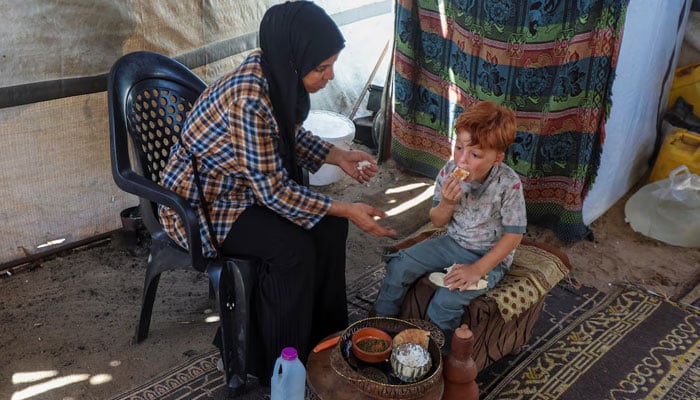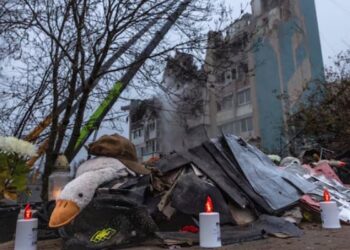Select Language:
A year of relentless Israeli airstrikes and tank shellings has compounded the heartbreak for displaced Palestinian Inas Abu Maamar.
In the initial days of the conflict, a Reuters photo captured Abu Maamar devastated in a hospital morgue, clutching the body of her five-year-old niece Saly, who had been killed in an Israeli missile attack on their home in Khan Younis, southern Gaza. Since then, Israeli strikes have claimed many of her loved ones, leaving her grieving, hungry, and homeless, while she cares for her orphaned young nephew.
Israeli Prime Minister Benjamin Netanyahu has supported a plan proposed by U.S. President Donald Trump for Gaza, and Hamas has shown partial acceptance, but there’s no clear timeline for when or if the war will end. Despite multiple ceasefire efforts since Israel launched its offensive on October 7, 2023, the violence persists.
Saly’s death came when an Israeli missile hit their house. Along with Saly, Abu Maamar lost her aunt, uncle, sister-in-law, and cousins, including Saly’s baby sister Seba. Earlier that summer, her father and brother Ramez, Saly’s father, were killed while bringing food back to the family.
According to local health authorities, more than 67,000 Palestinians have been killed by Israel’s military operations in Gaza. Many more are believed to be buried beneath the rubble, uncounted in official figures.
“The war has destroyed everything. It tore apart our family and our homes. It has left us with endless pain and loss,” says the 38-year-old Abu Maamar.
This offensive marks two years since Hamas fighters stormed across the Gaza border, killing around 1,200 people and taking about 250 hostages back into Gaza. Netanyahu vows to continue until Hamas is eradicated, and the Israeli military has intensified its operations by pushing deeper into Gaza City in the north. Israel claims it aims to avoid civilian casualties, striking only when Hamas members are seen emerging among civilians. Hamas denies using civilians as shields.
Abu Maamar and her remaining relatives have had to flee repeatedly over the past two years, seeking refuge in a crowded tent encampment on bare sand near the coast. Conditions are dire—diseases spread, clean water and food are scarce, and the constant threat of bombs keeps the community traumatized.
Her greatest concern is for her nephew Ahmed, Ramez’s son and Saly’s brother. He lost his family—his mother, both sisters, and maternal grandparents—within ten days of the conflict’s outbreak. Tragically, he also lost his father and paternal grandfather in June when they were killed while gathering food after supplies ran out.
“His father used to take him to the beach, play with him, visit his aunts,” Abu Maamar says. “Now, he spends all day in the tent.” Ahmed once found comfort in a cat they named Loz, but the cat died in August.
When Reuters last spoke to Abu Maamar a year ago, she said she was waiting for the cycle of bloodshed to stop. Now, she remains hopeful but fears the conflict will only end if more pressure is applied to Israel.
“We’ve lost so much—our loved ones, our homes. We left with them, but we want to return without them,” she states. “My biggest fear is that the war continues. We want this to end—once and for all.”






